综合英语unit3
研究生英语综合教程UNIT3课文及翻译(含汉译英英译汉)PDF版
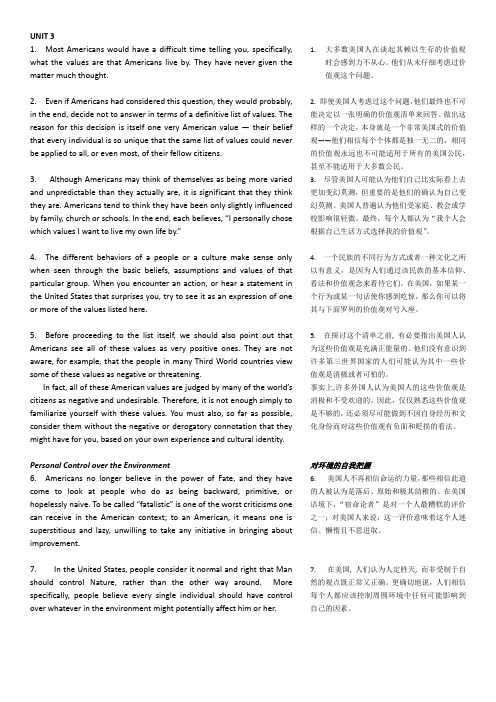
UNIT 31. Most Americans would have a difficult time telling you, specifically, what the values are that Americans live by. They have never given the matter much thought.2. Even if Americans had considered this question, they would probably, in the end, decide not to answer in terms of a definitive list of values. The reason for this decision is itself one very American value —their belief that every individual is so unique that the same list of values could never be applied to all, or even most, of their fellow citizens.3. Although Americans may think of themselves as being more varied and unpredictable than they actually are, it is significant that they think they are. Americans tend to think they have been only slightly influenced by family, church or schools. In the end, each believes, “I personally chose which values I want to live my own life by.”4. The different behaviors of a people or a culture make sense only when seen through the basic beliefs, assumptions and values of that particular group. When you encounter an action, or hear a statement in the United States that surprises you, try to see it as an expression of one or more of the values listed here.5. Before proceeding to the list itself, we should also point out that Americans see all of these values as very positive ones. They are not aware, for example, that the people in many Third World countries view some of these values as negative or threatening.In fact, all of these American values are judged by many of the world’s citizens as negative and undesirable. Therefore, it is not enough simply to familiarize yourself with these values. You must also, so far as possible, consider them without the negative or derogatory connotation that they might have for you, based on your own experience and cultural identity.Personal Control over the Environment6. Americans no longer believe in the power of Fate, and they have come to look at people who do as being backward, primitive, or hopelessly naive. To be called “fatalistic” is one of the worst criticisms one can receive in the American context; to an American, it means one is superstitious and lazy, unwilling to take any initiative in bringing about improvement.7. In the United States, people consider it normal and right that Man should control Nature, rather than the other way around. More specifically, people believe every single individual should have control over whatever in the environment might potentially affect him or her. 1.大多数美国人在谈起其赖以生存的价值观时会感到力不从心。
综合英语4-Unit 3 Vocabulary

Unit 3 Alienation and the InternetWords and Expressions1.given: prep. when you consider sth. 考虑到,如果adj. 假设的,特定的e.g. Given his age (= considering how old he is), he’s remarkably active.Given her interest in children, teaching seems the right job for her.given that: conj. 假定,考虑到e.g. It was surprising the government was re-elected, given that they had raised taxes so much.given: a. fixed for a purpose and stated as suche.g. They were to meet at a given time and place.2.equivalent: n. sth. equal in value, measure, force, effect or significance 相等物Comparison: equivalent (of/to sth.)e.g. The dress cost the equivalent of a week’s salary.What is the equivalent of fifty pounds in US dollars?equivalent: a. equal in value, amount, meaning, importance, etc. 相等的Comparison: equivalent (to sth.)e.g. Eight kilometers is roughly equivalent to five miles.3.dramatically: ad. suddenly and noticeably 戏剧性地,引人注目地e.g. Prices have fallen dramatically.Events could have developed in a dramatically different way.Derivation: dramatic a.e.g. a dramatic increase/fall/change/improvementdramatic results/developments/news4.alter: v. become different; make sb./sth. different 改变,更改e.g. He had altered so much that I scarcely recognized him.Nothing can alter the fact that we are to blame.The landscape has been radically altered, severely damaging wildlife.Derivation:alteration: n. a change to sth. that makes it different 交互,轮流,变换e.g. They are making major/minor alterations to the house.5.further: v. help forward 促进,推动e.g. Additional training is probably the best way to further your career these days.The interests of an organization will never be furthered through acts of terrorism.6.fragment: v. break into parts or small pieces 使破碎,分裂/frag’ment/e.g. The satellite will fragment and burn up as it falls through the Earth’s atmosphere.The government is planning to fragment the industry before privatizing it.fragment: n. a small part of sth. that has broken off or comes from sth. Largere.g. Police found fragments of glass near the scene.I overheard a fragment of their conversation.Pronunciation:Note that when the same form is used as a noun, the stress shifts to the first syllable.Derivation:fragmentation n. 分裂e.g. the fragmentation of the country into small independent statesfragmented a. 成碎片的,片段的e.g. a fragmented society7.alienate: v. cause sb. to feel very distant from or not welcome to sb. else 使疏远,离间,麻木e.g. She was alienated from her brother by her foolish behavior.All these changes to the newspaper have alienated its traditional readers.Derivations:alien: a. & n. 外国的,陌生的;外星人e.g. In a world that had suddenly become alien and dangerous, he was her only security.aliens from outer space (n.)alienation: n. 疏远,离间,[哲]异化e.g. The new policy resulted in the alienation of many voters.Many immigrants suffer from a sense of alienation.8.addicted: a. being dependent on sth. and wanting to spend as much time doing it as possibleCollocation:be addicted to sth.e.g. Some youngsters are hopelessly addicted to video games.She’s become addicted to love stories.Derivations:addiction: n. 沉溺,上瘾e.g. He is now fighting his addiction to alcohol.addictive: a. 使人上瘾的e.g. Heroin is highly addictive.9.alcoholic: n. sb. who cannot stop drinking large amounts of alcohol, even when this is makinghim/her ill 酗酒者Word Formation:-aholic: (suffix in nouns) liking sth. very much and unable to stop doing or using ite.g. shopaholic; chocaholic; workaholic 购物狂;巧克力迷;工作狂10.in that: conj. (formal) for the reason that; because 因为e.g. She was fortunate in that she had friends to help her.Men differ from brutes in that they can think and speak.The news was all the more reliable in that it was from an official source.11.be given to: (formal) so sth. often or regularlyCollocation:e.g. The evidence against him was overwhelming.She had the almost overwhelming desire to tell him the truth.Derivation:be given to sth. / doing sth.e.g. He is given to heavy drinking.He is given to going for long walk on his own.12.exaggeration: n. continue in a course of action even in the face of difficulty or with little or noindication of success 夸张e.g. He told his story simply and without exaggeration.Derivations:exaggerate: v. make sth. seem larger, better, worse or more important than it really ise.g. The hotel was really filthy and I’m not exaggerating.He tends to exaggerate the difficulties.13.binge: n. an occasion when an activity is done in an extreme way, esp. eating, drinking orspending money 狂欢,作乐e.g. go on a binge / an Internet binge / a chocolate bingeOne of the symptoms of this disease is binge eating.14.skew: v. cause to be not straight or exact; twist 歪斜,扭转e.g. The company’s results for this year are skewed because not all our customers have paidtheir bills.Today’s election will skew the results in favor of the northern end of the country.ment: v. express sadness and regret about sth. 惋惜,哀悼e.g. He lamented the death of his friend.She lamented that she had never been to Paris.Derivation:lamentable: a. very disappointing 可悲的,哀伤的,可怜的e.g. She shows a lamentable lack of understanding.16.… it struck us that …: … it occurred to us that … / … we suddenly realized that …e.g. How does the concert last night strike you?He struck me as an odd, old-fashioned professor of Chinese.17.confront: 面对,遭遇(1)v. deal with a problem or difficult situationSynonym:face up to 大胆面对,勇于正视e.g. She knew that she had to confront her fears.He manifested extraordinary courage when confronted with formidable difficulty.(2) face sb. so that they cannot avoid seeing and hearing you, esp. in an unfriendly ordangerous situatione.g. The lawyer confronted the accused man with the forged check.This was the first time he had confronted an armed robber.18.perceive: v. see, notice, or realize sth., esp. when it is not obvious 注意到,察觉到,认为e.g. I perceived a change in his behavior.She perceived that all was not well.The patient was perceived to have difficulty in breathing.Derivations:perception: n. 观念,洞察力,认识能力perceptive: a. having or showing the ability to see or understand things quickly, esp.things that are not obvious 敏感的,有洞察力的,感知的e.g. It was very perceptive of you to notice that.perceptible: a. great enough for you to notice it (Synonym: noticeable) 可察觉的,能感觉到的e.g. Her foreign accent was barely perceptible.19.converse: n. the opposite 相反的e.g. In the U.S., cars are driven on the right side of the road, but in Britain the converseapplies.It is possible, of course, that the converse of this theory may also be true.20.maximize:(1) v. increase sth. as much as possiblee.g. maximize efficiency/fitness/profits[computing] Maximize the window to full screen.(2)v. make the best use of sth.e.g. maximize opportunities/resourcesAntonym: minimizeVocabulary ExercisesIII. Word Derivation1.alienation n. → alienate v.(1)制造业的工作又枯燥又单调,使许多工人产生了一种疏离感。
研究生综合英语Unit3

研究生综合英语Unit3简介研究生综合英语是研究生阶段必修的一门专业英语课程,旨在提高学生的英语综合应用能力。
Unit3是该课程的第三单元,主要涉及科技与创新领域的话题。
本文将对Unit3的主要内容进行介绍。
内容Unit3主要包括以下几个部分:1. 词汇扩展在Unit3中,学生将会学习与科技和创新相关的词汇。
这些词汇涵盖了从基础的科学概念到现代科技发展的各个方面。
通过学习这些词汇,学生可以扩展自己的科技词汇量,并且能够更好地理解相关的科技和创新话题。
2. 阅读理解Unit3中的阅读材料主要集中在科技和创新领域的最新研究和发展。
通过阅读这些材料,学生可以了解到当前科技领域的最新动态,同时提高阅读理解能力。
此外,学生还将学习如何通过阅读材料,获取关键信息和进行更深层次的分析。
3. 口语表达与讨论在Unit3的口语表达和讨论环节,学生将通过与同学们的讨论,探讨科技与创新对社会和个人的影响。
通过这些讨论,学生可以提高自己的口语表达能力,并且学会倾听和理解他人观点的能力。
这些讨论还可以促进学生之间的交流和合作。
4. 写作任务Unit3的写作任务主要包括科技和创新领域的报告和短文写作。
学生将通过写作任务提高自己的写作能力,并且能够独立思考和表达自己的观点。
写作任务还要求学生进行研究和分析,培养学生的科学研究和思考能力。
学习目标通过学习Unit3,学生可以实现以下几个学习目标:•扩展科技和创新领域的词汇量;•提高阅读理解能力,了解科技领域的最新动态;•改善口语表达能力,学会与他人讨论科技和创新话题;•提升写作能力,学会进行科技和创新领域的研究并进行报告和短文写作。
总结研究生综合英语Unit3主要涉及科技与创新领域的词汇扩展、阅读理解、口语表达与讨论以及写作任务。
通过学习Unit3,学生可以提高自己的英语综合应用能力,并且了解到科技领域的最新动态。
同时,学生还可以培养自己的研究和思考能力,为将来的科技与创新工作奠定基础。
何兆雄综合英语Unit3
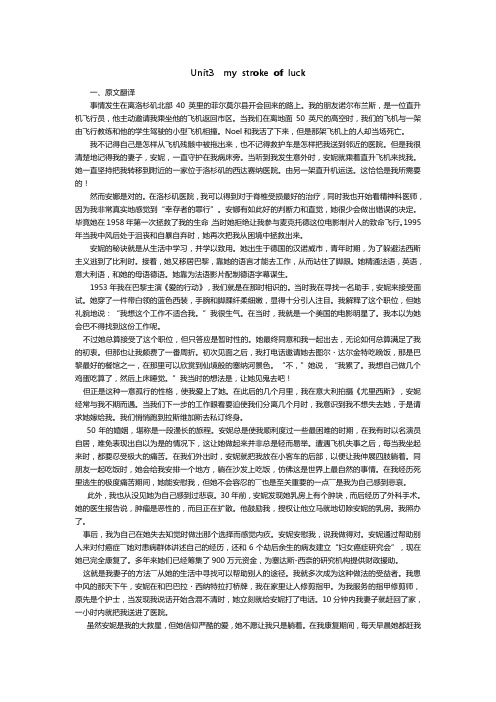
Unit3 my stroke of luck一、原文翻译事情发生在离洛杉矶北部40英里的菲尔莫尔县开会回来的路上。
我的朋友诺尔布兰斯,是一位直升机飞行员,他主动邀请我乘坐他的飞机返回市区。
当我们在离地面50英尺的高空时,我们的飞机与一架由飞行教练和他的学生驾驶的小型飞机相撞。
Noel和我活了下来,但是那架飞机上的人却当场死亡。
我不记得自己是怎样从飞机残骸中被拖出来,也不记得救护车是怎样把我送到邻近的医院。
但是我很清楚地记得我的妻子,安妮,一直守护在我病床旁。
当听到我发生意外时,安妮就乘着直升飞机来找我。
她一直坚持把我转移到附近的一家位于洛杉矶的西达赛纳医院。
由另一架直升机运送。
这恰恰是我所需要的!然而安娜是对的。
在洛杉矶医院,我可以得到对于脊椎受损最好的治疗,同时我也开始看精神科医师,因为我非常真实地感觉到“幸存者的罪行”。
安娜有如此好的判断力和直觉,她很少会做出错误的决定。
毕竟她在1958年第一次拯救了我的生命,当时她拒绝让我参与麦克托德这位电影制片人的致命飞行。
1995年当我中风后处于沮丧和自暴自弃时,她再次把我从困境中拯救出来。
安妮的秘诀就是从生活中学习,并学以致用。
她出生于德国的汉诺威市,青年时期,为了躲避法西斯主义逃到了比利时。
接着,她又移居巴黎,靠她的语言才能去工作,从而站住了脚跟。
她精通法语,英语,意大利语,和她的母语德语。
她靠为法语影片配制德语字幕谋生。
1953年我在巴黎主演《爱的行动》,我们就是在那时相识的。
当时我在寻找一名助手,安妮来接受面试。
她穿了一件带白领的蓝色西装,手腕和脚踝纤柔细嫩,显得十分引人注目。
我解释了这个职位,但她礼貌地说:“我想这个工作不适合我。
”我很生气。
在当时,我就是一个美国的电影明星了。
我本以为她会巴不得找到这份工作呢。
不过她总算接受了这个职位,但只答应是暂时性的。
她最终同意和我一起出去,无论如何总算满足了我的初衷。
但那也让我颇费了一番周折。
初次见面之后,我打电话邀请她去图尔・达尔金特吃晚饭,那是巴黎最好的餐馆之一,在那里可以欣赏到仙境般的塞纳河景色。
大学综合英语教程第一册Unit 3

5. What good manners does the writer suggest that we should display?
6. Do you agree with the writer that good manners with our families count the most? Justify your reply.
精品PPT
Pre-reading
Saying “Thank you.” — When do you say “Thank you” to others?
Do you say “Thank you” in the following situations?
someone holds a door open for you
Para. 1: a social phenomenon — many people in present times are not as polite as people in the past
Paras. 2 – 4:
the author’s viewpoint — one cannot be truly stylish without good manners, and good manners are a sort of hidden beauty secret Paras. 5-10: illustrations of good manners — the great power of some typical good manners and the good effects polite manners have on our own family members Para. 11: the author’s sincere wish — everyone would show good manners
学术综合英语参考答案unit3
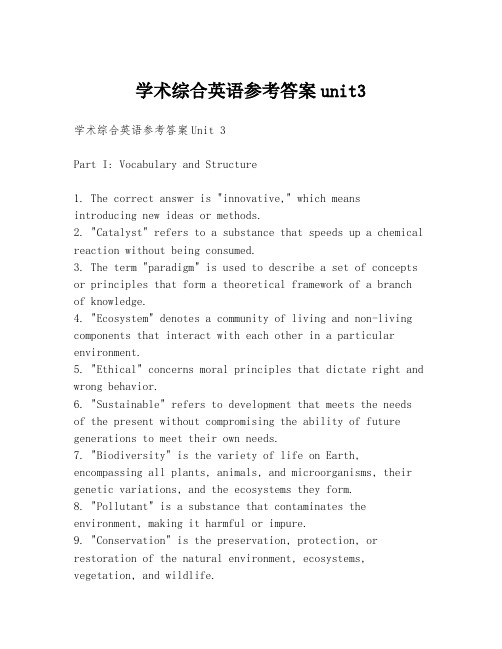
学术综合英语参考答案unit3学术综合英语参考答案Unit 3Part I: Vocabulary and Structure1. The correct answer is "innovative," which means introducing new ideas or methods.2. "Catalyst" refers to a substance that speeds up a chemical reaction without being consumed.3. The term "paradigm" is used to describe a set of concepts or principles that form a theoretical framework of a branch of knowledge.4. "Ecosystem" denotes a community of living and non-living components that interact with each other in a particular environment.5. "Ethical" concerns moral principles that dictate right and wrong behavior.6. "Sustainable" refers to development that meets the needs of the present without compromising the ability of future generations to meet their own needs.7. "Biodiversity" is the variety of life on Earth, encompassing all plants, animals, and microorganisms, their genetic variations, and the ecosystems they form.8. "Pollutant" is a substance that contaminates the environment, making it harmful or impure.9. "Conservation" is the preservation, protection, or restoration of the natural environment, ecosystems, vegetation, and wildlife.10. "Renewable" describes resources that can be replenished naturally and sustainably over time.Part II: Reading ComprehensionA. True or False Questions1. True. The passage states that the use of renewable energy sources can reduce reliance on fossil fuels.2. False. The text mentions that while renewable energy can help reduce greenhouse gas emissions, it does not completely eliminate them.3. True. The passage highlights the importance of researchand development in advancing renewable energy technologies.4. False. The text indicates that while renewable energy is abundant, it can be inconsistent, requiring storage solutions.5. True. The passage discusses the potential for renewable energy to create jobs and stimulate economic growth.B. Multiple Choice Questions1. C. The passage mentions that solar power is a clean and inexhaustible source of energy.2. B. The text explains that wind turbines convert windenergy into electricity.3. A. The passage states that hydroelectric power isgenerated by the movement of water.4. D. The text describes bioenergy as energy derived from organic material.5. E. The passage mentions that geothermal energy is heatfrom the Earth's interior.C. Fill in the Blanks1. photovoltaic cells2. carbon footprint3. intermittency4. energy storage5. grid integrationPart III: Cloze Test1. sustainable2. innovative3. paradigm4. ecosystem5. pollutants6. ethical7. biodiversity8. renewable9. conservation10. catalystPart IV: Writing TaskIn this section, you are asked to write an essay on the topic of "The Importance of Renewable Energy in the 21st Century." Your essay should cover the following points:- The increasing demand for energy and the challenges of relying on fossil fuels.- The benefits of renewable energy sources, such as solar,wind, and hydroelectric power.- The role of technology in advancing renewable energy solutions.- The economic and environmental implications of a transition to renewable energy.- The need for policy support and public awareness to promote the adoption of renewable energy.Sample Essay:The 21st century has ushered in an era of unprecedented energy demand, driven by global population growth and industrialization. Traditional fossil fuels, while abundant, present significant challenges, including environmental degradation and the potential for resource depletion. In contrast, renewable energy sources offer a sustainable alternative that can help mitigate these issues.Renewable energy, derived from the sun, wind, and water, among other sources, is inexhaustible and clean. Solar panels convert sunlight into electricity, wind turbines harness the power of the wind, and hydroelectric dams utilize the force of flowing water. These technologies not only reduce greenhouse gas emissions but also decrease our dependence on finite resources.Advancements in technology have made renewable energy more efficient and cost-effective. Innovations in energy storage and grid integration are addressing the intermittency of renewable sources, making them more reliable and accessible. Furthermore, the transition to renewable energy is aneconomic opportunity, with the potential to create new jobs and stimulate growth in the clean energy sector.However, the shift to renewable energy requires robust policy support and public awareness. Governments must enact incentives for renewable energy development and implement regulations that reduce the environmental impact oftraditional energy sources. Public education campaigns can also play a crucial role in fostering a societal understanding of the benefits of renewable energy and encouraging its adoption.In conclusion, the importance of renewable energy in the 21st century cannot be overstated. As we face the dual challenges of energy scarcity and environmental sustainability, renewable energy offers a promising path forward. With continued innovation, policy support, and public engagement, we can harness the power of the sun, wind, and water to build a cleaner。
大学英语综合教程3unit3
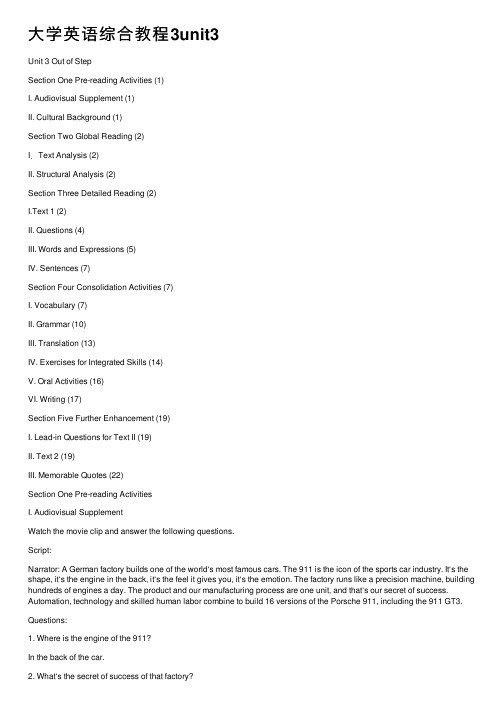
⼤学英语综合教程3unit3Unit 3 Out of StepSection One Pre-reading Activities (1)I. Audiovisual Supplement (1)II. Cultural Background (1)Section Two Global Reading (2)I.Text Analysis (2)II. Structural Analysis (2)Section Three Detailed Reading (2)I.Text 1 (2)II. Questions (4)III. Words and Expressions (5)IV. Sentences (7)Section Four Consolidation Activities (7)I. Vocabulary (7)II. Grammar (10)III. Translation (13)IV. Exercises for Integrated Skills (14)V. Oral Activities (16)VI. Writing (17)Section Five Further Enhancement (19)I. Lead-in Questions for Text II (19)II. Text 2 (19)III. Memorable Quotes (22)Section One Pre-reading ActivitiesI. Audiovisual SupplementWatch the movie clip and answer the following questions.Script:Narrator: A German factory builds one of the world‘s most famous cars. The 911 is the icon of the sports car industry. It‘s the shape, it‘s the engine in the back, it‘s the feel it gives you, it‘s the emotion. The factory runs like a precision machine, building hundreds of engines a day. The product and our manufacturing process are one unit, and that‘s our secret of success. Automation, technology and skilled human labor combine to build 16 versions of the Porsche 911, including the 911 GT3.Questions:1. Where is the engine of the 911?In the back of the car.2. What‘s the secret of success of that factory?The product and their manufacturing process are one unit. Automation, technology and skilled human labor combine to build the Porsche 911. And the factory runs like a precision machine.II. Cultural Background1. Car culture has been a major niche lifestyle in America.2. In the 1950s, the post-war boom produced a generation of teenagers with enough income to buy their own cars. These cars became so much more than just modes of transportation. They were reflections of a lifestyle. The ability to tune and soup-up muscle cars gave average Joes the opportunity to show off their power, their speed and their style in a way that personified the car as character.3. Like Granny in Jan and Dean's 1964 song ―The Little Old Lady from Pasadena,‖ we can't keep our foot off the accelerator.4. We are crazy about our cars —and always have been. ―The American,‖William Faulkner lamented in 1948, ―really loves nothing but his automobile.‖5. We dream of cars as we dream of lovers.6. Americans have always cherished personal freedom and mobility, rugged individualism and masculine force.Section Two Global ReadingI.Text AnalysisMain Idea―Out of Step‖ is an exposition that presents the absurdity of the Americans‘ dependence on cars. The Americans, being so accustomed to using cars, have almost forgotten the existence of their legs. Wherever they go, they go in their cars. As a result, pedestrian facilities are neglected in city planning or rejected by the inhabitants.II. Structural AnalysisParagraph 1-6 The writer introduces his idea with an anecdote.Paragraphs 7-13 In this part, the author presents the fact that the Americans are habituated to using cars for everything. Paragraphs 14-20 In this part, the author explains that pedestrian facilities are neglected or discarded.Section Three Detailed ReadingI.Text 1Out of StepBill Bryson1After living in England for 20 years, my wife and I decided to move back to the United States. We wanted to live in a town small enough that we could walk to the business district, and settled on Hanover, N.H., a typical New England town —pleasant, sedate and compact. It has a broad central green surrounded by the venerable buildings of Dartmouth College, an old-fashioned Main Street and leafy residential neighborhoods.2It is, in short, an agreeable, easy place to go about one‘s business on foot, and yet as far as I can tell, virtually no one does.3Nearly every day, I walk to the post office or library or bookstore, and sometimes, if I am feeling particularly debonair, I stop at Rosey Jekes Caféfor a cappuccino. Occasionally, in the evenings, my wife and I stroll up to the Nugget Theatre for a movie or to Murphy‘s on the Green for a beer, I wouldn‘t dream of going to any of these places by car. People have gotten used to my eccentric behavior, but in the early days acquaintances would often pull up to the curb and ask if I wanted a ride.4―I‘m going your way,‖ they would insist when I politely declined. ―Really, it‘s no bother.‖5―Honestly, I enjoy walking.‖6―Well, if you‘re sure,‖ they would say and depart reluctantly, even guiltily, as if leaving the scene of an accident without giving their name.7In the United States we have become so habituated to using the car for everything that it doesn‘t occur to us to unfurl our legs and see what those lower limbs can do. We have reached an age where college students expect to drive between classes, where parents will drive three blocks to pick up their children from a friend‘s house, where the letter carrier takes his van up and down every driveway on a street.8We will go through the most extraordinary contortions to save ourselves from walking. Sometimes it‘s almost ludicrous. The other day I was waiting to bring home one of my children from a piano lesson when a car stopped outside a post office, and a man about my age popped out and dashed inside. He was in the post office for about three or four minutes, and then came out, got in the car and drove exactly 16 feet (I had nothing better to do, so I paced it off) to the general store6 next door.9And the thing is, this man looked really fit. I‘m sure he jogs extravagant distances and plays squash and does all kinds of healthful things, but I am just as sure that he drives to each of these undertakings.10An acquaintance of ours was complaining the other day about the difficulty of finding a place to park outside the local gymnasium. She goes there several times a week to walk on a treadmill. The gymnasium is, at most, a six-minute walk from her front door.11I asked her why she didn‘t walk to the gym and do six minutes less on the treadmill.12She looked at me as if I were tragically simple-minded and said, ―But I have a program for the treadmill. It records my distance and speed and calorie burn rate, and I can adjust it for degree of difficulty.‖13I confess it had not occurred to me how thoughtlessly deficient nature is in this regard.14According to a concerned and faintly horrified 1997 editorial in the Boston Globe, the United States spent less than one percent of its transportation budget on facilities for pedestrians. Actually, I‘m surprised it was that much. Go to almost any suburb developed in the last 30 years, and you will not find a sidewalk anywhere. Often you won‘t find a single pedestrian crossing.15I had this brought home to me one summer when we were driving across Maine and stopped for coffee in one of those endless zones of shopping malls, motels, gas stations and fast-food places. I noticed there was a bookstore across the street, so I decided to skip coffee and head over.16Although the bookshop was no more than 70 or 80 feet away, I discovered that there was no way to cross on foot without dodging over six lanes of swiftly moving traffic. In the end, I had to get in our car and drive across.17At the time, it seemed ridiculous and exasperating, but afterward I realized that I was possibly the only person ever to have entertained the notion of negotiating that intersection on foot.18The fact is, we not only don‘t walk anywhere anymore in this country, we won‘t walk anywhere, and woe to anyone who tries to make us, as the city of Laconia, N.H., discovered. In the early 1970s, Laconia spent millions on a comprehensive urban renewal project, which included building a pedestrian mall to make shopping more pleasant. Esthetically it was a triumph —urban planners came from all over to coo and take photos--but commercially it was a disaster. Forced to walk onewhole block from a parking garage, shoppers abandoned downtown Laconia for suburban malls.19In 1994 Laconia dug up its pretty paving blocks, took away the tubs of geraniums and decorative trees, and brought back the cars. Now people can park right in front of the stores again, and downtown Laconia thrives anew.20And if that isn‘t sad. I don‘t know what is.II. Questions1)What kind of town is it? (Paragraph 1)It is a small, pleasant and agreeable town. The inhabitants are friendly and willing to help.But although the town is compact, few people go about on foot.2)What is considered the author‘s ―eccentric behavior‖? (Paragraph 3)Instead of riding a car, the author walks around the city, doing his shopping, going to themovies or visiting the café or bar. To people who are used to going everywhere in a car, he is an eccentric.3)Why would drivers ―depart reluctantly, even guiltily‖when their offer was declined?(Paragraphs 3-6)With cars becoming the basic essentials of their life, people are so habituated to using the car for everything. The scene of somebody walking around seemed so unusual to them that they would naturally show their concern to him. When their offer to give him a ride was declined, they were sorry for not being able to help him out.4) Why did the author say ―Actually, I‘m surprised it was that much‖? (Paragraph 14)When the author found that the newly planned suburbs totally overlooked pedestrian needs, he assumed there was no budget for pedestrian facilities at all. So he says he was surprised to learn that there actually was less than one percent of budget on it. Here the author writes with a touch of irony.5) Why did Laconia change its downtown pedestrian mall to one with parking lots? (Paragraphs18-19)Although the pedestrian mall was well decorated, shoppers were unwilling to walk to the stores from a parking garage. As a result, it was a commercial failure. The government had to compromise with the public preference.Class ActivityGroup discussion: What does the title mean?With the use of this title, the writer seems to suggest1. people no longer walk in America;2. the few people who do walk seem to be old-fashioned and ―eccentric‖.III. Words and ExpressionsParagraphs 1-6sedate a. calm, serious and formale.g. She is a sedate old lady; she is caring but never talks much.The fight against a nuclear power station site has transformed a normally sedate town into a battlefield.v. make calm or sleepy, esp. with a druge.g. The patient was heavily sedated and resting quietly in bed.Derivation: sedately (ad.), sedation (n.), sedative (a., n.)eccentric a.(of people or behavior) unconventional and slightly strangee.g. The old gentleman, who lived alone all his life, was said to have some eccentric habits.n. a person of unconventional and slightly strange views or behaviore.g. The old gentleman enjoyed a colorful reputation as an engaging eccentric.curb n. (British English: kerb) a line of raised stones separating the footpath from the road v./ n. ( place) a control or limit on sth. undesirablee.g.Poor nutrition can curb a child‘s development both physically and mentally.There will be now curbs on drunk-driving from next month.Paragraphs 7-12habituate v. accustom by frequent repetition or prolonged exposuree.g. You must habituate yourself to reading aloud.By the end of the school term, the students had been habituated / accustomed / used to rising at five o‘clock.contortion n. a twisted position or movement that looks surprising or strangee.g. The spectators cannot but admire the contortions of the gymnasts.Derivation: contort v. cause sth. to twist out of its natural shape and looks strange or unttractive Comparison: distort, twist, deform, contort & warpThese verbs mean to change and spoil the form or character of sth.distortTo distort is to alter in shape, as by torsion or wrenching; the term also applies to verbal or pictorial misrepresentation and to alteration or perversion of the meaning of sth.e.g. The human understanding is like a false mirror, which, receiving rays irregularly distorts and discolors the nature of things by mingling its own nature with it. (Francis Bacon).twistTwist applies to distortion of form or meaning.e.g. a mouth twisted with painHe accused me of twisting his words to mean what I wanted them to.deformIf you deform sth., or if it deforms, its usual shape changes so that its usefulness or appearance is spoiled.e.g. Great erosion deformed the landscape.The earlier part of his discourse was deformed by pedantic divisions and subdivisions.contortIf you contort sth., or if it contorts, it twists out of its normal shape and looks strange or unattractive.e.g. a face contorted with rage;a contorted line of reasoning.warpWarp can refer to a turning or twisting from a flat or straight form.e.g. The floorboards had warped over the years.It also can imply influencing sb. in a way that has a harmful effect on how they think or behave.e.g. Prejudice warps the judgment.Paragraphs 13-20bring sth. home to sb.: make sb. realize sth.e.g.The news report has brought home to us all the plight of the prisoners of war.Comparison: drive sth. home to sb., hit / strike homedrive sth. home to sb.: make sb. realize sth., esp. by saying it often, loudly, angrily, etc.e.g. The professor drove home to them that they must finish the writing assignment by Friday.hit / strike home: (of remarks, etc.) have the intended (often painful) effecte.g. You could see from his expression that her sarcastic comments had hit/stricken home.entertain v. consider an idea, etc. or allow yourself to think that sth. might happen or be truee.g. He refused to entertain our proposal.entertain ideas, doubts, etcnegotiate v.get over or past (an obstacle, etc.) successfully; manage to travel along a difficult routee.g. The only way to negotiate the path is on foot.Frank Mariano negotiates the dessert terrain in his battered pickup.Practice那攀登者得攀越⼀陡峭岩⽯。
综合英语教程3 Unit_3_Saved_by_His_Mistakes
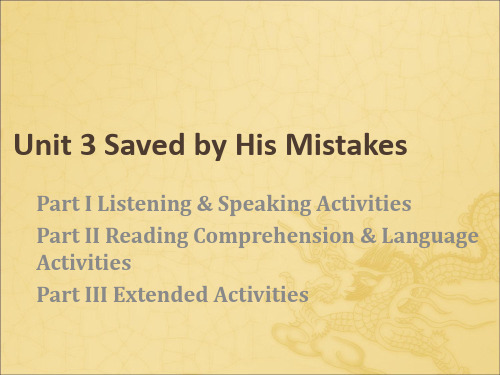
--They rushed forward to congratulate the speaker on the perfect landing.
Retell the Story
An Outline
I. On her way home from a business trip II. Something wrong with the plane
Expressions of fear: frightened, panic-stricken, panicked, panicky, terrified, horrified, scared, appalled,
shaken, startled, astounded, dismayed, devastated, become hysterical (歇斯底里 的), act frantically/furiously/desperately (因害怕而行为发狂的)
3. What do “his mistakes” refer to?
--These are his two pups, Mistake No.1 and Mistake No.2, which he had bought them for 5 dollars and were mocked at by his elder brother.
Expressions for solving problems: put…right, sort things out, clear things up, figure out what to do /how to do it, straighten things out, get to the bottom of things
综合英语III Unit 3 Chinese Food

Classroom Activity
Appreciate the pictures of many different food, and guess where are they come from. Here are some options: China, Thailand, France, Italy, Japan.
success of Chinese food. Part Three: (Para. 7-9) Elaborate the nature of Chinese foodБайду номын сангаас
Part I Analysis
• Answer the following questions:
1. In the life of an individual, how, according to Kenneth Lo, is food different from music, a lecture or conversation, or matter of business?
• Taoist thought generally focuses on nature, the relationship between humanity and the cosmos (天人相应), health and longevity, and wu wei action through inaction), which is thought to produce harmony with the Universe.
2. How does Lo make his point clear? 3. Why, according to the writer, do the Westerners
新标准大学英语综合教程3 unit3 课文翻译
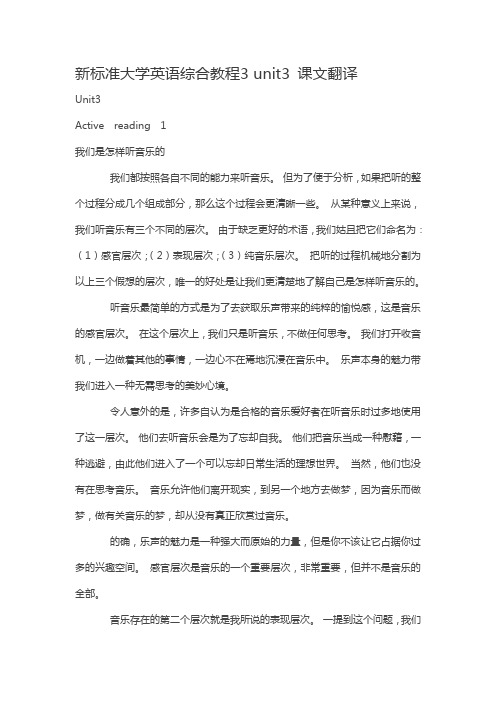
新标准大学英语综合教程3 unit3 课文翻译Unit3Active reading 1我们是怎样听音乐的我们都按照各自不同的能力来听音乐。
但为了便于分析,如果把听的整个过程分成几个组成部分,那么这个过程会更清晰一些。
从某种意义上来说,我们听音乐有三个不同的层次。
由于缺乏更好的术语,我们姑且把它们命名为:(1)感官层次;(2)表现层次;(3)纯音乐层次。
把听的过程机械地分割为以上三个假想的层次,唯一的好处是让我们更清楚地了解自己是怎样听音乐的。
听音乐最简单的方式是为了去获取乐声带来的纯粹的愉悦感,这是音乐的感官层次。
在这个层次上,我们只是听音乐,不做任何思考。
我们打开收音机,一边做着其他的事情,一边心不在焉地沉浸在音乐中。
乐声本身的魅力带我们进入一种无需思考的美妙心境。
令人意外的是,许多自认为是合格的音乐爱好者在听音乐时过多地使用了这一层次。
他们去听音乐会是为了忘却自我。
他们把音乐当成一种慰藉,一种逃避,由此他们进入了一个可以忘却日常生活的理想世界。
当然,他们也没有在思考音乐。
音乐允许他们离开现实,到另一个地方去做梦,因为音乐而做梦,做有关音乐的梦,却从没有真正欣赏过音乐。
的确,乐声的魅力是一种强大而原始的力量,但是你不该让它占据你过多的兴趣空间。
感官层次是音乐的一个重要层次,非常重要,但并不是音乐的全部。
音乐存在的第二个层次就是我所说的表现层次。
一提到这个问题,我们马上就进入到一个颇具争议的领域。
作曲家总是设法避开有关音乐表现方面的讨论。
斯特拉温斯基不是曾经声称他的音乐是一个“物体”,是一件有自我生命的“东西”,除了纯音乐性的存在之外没有任何别的含意吗?斯特拉温斯基这种不妥协的态度可能源于这样的一个事实:有那么多的人尝试着从众多的音乐作品中读出完全不同的含意。
确实,要准确地说出一部音乐作品的含意已经很难了,要肯定并确定地说出来,还要使每个人对你的解释都感到满意,是难上加难。
但我们不该因此走到另一个极端,不能去剥夺音乐“表现”的权利。
新时代核心英语教程 综合英语3教学课件unit3

Detailed Study of the Text
Part II
7. Basic, but you don’t come here for superlative luxury—the attraction is the private jungle—10 hectares of verdant foliage and colourful birds and flowers. (Para. 12)
Detailed Study of the Text
Part I
2. Away from the boutique hotels of the Angkor Wat service town of Siem Reap and the cappuccinos and NGO crowd of the capital Phnom Penh, travelling in Cambodia has a distinct edge—and is full of wonderful surprises. (Para. 2)
Part II
Paras. 11-17
Spooner describes the visit to Ratanakiri and Yaklom Lake on the
second day.
Detailed Study of the Text
Part I
1. As I kayaked down the Mekong River, a couple of humps slunk out of the water about 10 metres ahead. (Para. 1)
Pair discussion :
综合英语3unit3资料

B. Explain the meaning of the following sentences.1.I know that my own intense “when I grow up” yearnings throughoutchildhood were locked in combat with an equally intense wish thatnothing would ever change.2.Worst of all, I could tell from their responses to this cruel andannoying behavior that I would lose my senses and becomebrainlessly boy-crazy.3.At 50, I blew out the candles with good humor because I had to—butI gulped inside.4.But there is another truth available, an inexplicable and sometimescrazy truth that is no less compelling. The living of a life, day by dayand moment, is also wild with joy.3plete the sentences with the words below. Change the form wherenecessary.sob yearning adolescent detestable ponytailsnap confess intense compelling combat1.The troops were exhausted after months of fierce .2.The people who do this fighting thing are .3.He had a deep to return to his hometown.4.The child covered her face with her hands and started touncontrollably.5.However, I must that I do not find this to be a seriousproblem, at least, not yet.6.John changed from a friendly and cheerful young boy into aconfused .7.Young people today are under pressure to succeed.8.The court was presented with evidence that she’d murderedher husband.9.One of the strings on my guitar when I was turning it.10.S he often showed up late for class, and she chewed gum and tossedher .plete the sentences with the expressions below. Change the formwhere necessary.in combat with toward the end of instead of on the edge of blow out used to by all means be wild with1.My parents worked in Japan for four years, so I flyover there to see them in holidays.2.He plans to take a trip around the world the year.3.Six soldiers were seriously hurt the enemy.4.Hull is on the east coast of Britain. It is the river Humberwhich leads out to the North Sea.5.We should get it finished in time .6.The wind her candle and she could n’t see anything butthe shining stars in the sky.7.I took bus subway, which can save me 1.6 yuan each time.plete the following sentences with “used to” or “be/get used to”.Change the form when necessary.1.He live in Paris.2.He living in the country.3.When we were children we go skating every winter.4.I don’t smoke these days, but I .5.He the cold weather after he lived there for two years.6.Life was so different in the country and she couldn’t thefresh air, the slower pace, and the cleanliness of everything.2A.Tick the verbs or phrases below which can fill in the blanks, and crossout those which cannot.1.She thinks that her mother will do the job.a.help herb. agree toc. enjoy2.Although it was hard at first, she came working for theairline.a.to enjoyb. enjoyingc. enjoy3.We have tried to persuade her to stop, but she just goes on .a.to smokeb. smokingc. smoke4.Tom begs his grandmother about the war.a.to tellb. to tell himc. telling him5.He’d like stories about the war.a.to hearb. hearingc. her to tell him6.He always enjoys his grandmother talking about herchildhood.a.to listen tob. listening toc. hearing to7.Jack play with his little brother.a.is madeb. is told toc. is made to8.He playing with Jim.a.can’t standb. doesn’t wantc. dislikes9.Passing the kitchen, he stopped a large glass of water.a.drinkingb. pouringc. to drink10.H e her to send him a birthday present.a.remembersb. remindsc. asks3plete the sentences with the words produced from Exercise A.Change the form where necessary.1.The students often have difficulty in their learning because theyhave a (an) grasp of some concepts.2.Any behavior that causes us potential damage isabsolutely .3.We won’t intervene unless the child is physically .4.How can you yourself by writing such trash?5.It seems the bank always profits from farmers’.6.My parents thought it was for a boy to be interested inballet.7.I recognized the doctor’s messy and handwriting.8.The virus will your computer.9.He seemed of understanding how she felt.10.H is father was an farm worker. He had never went toschool.ExtensionWhen did sheReally grow up?Beverly BeckhamEvery night after I tucked her into bed, I sang to her, a silly song, a made-up song, our song. “Stay little, stay little, little little stay; little stay little stay little.”She would giggle and I would smile. The next morning I would say, “Look at you. You grew. The song didn’t work.”I sang that song for years, and every time I finished, she crossed her heart and promised she wouldn’t grow any more.Then one night, I stopped singing it. Who knows why. Maybe her door was closed. Maybe she was studying. Maybe she was on the phone talking to someone. Or maybe I realized it was time to give her permission to grow.It seems to me now that our song must have had some magic because all the nights I sang it, she remained a baby…four, five, six, seven, eight, nine, ten. They felt the same. They even looked the same. She got taller and new ones grew in, but she still had to be reminded to brush them and to take a shower every now and then.She played with dolls and Play-Doh. Though Candy Land was abandoned for Monopoly and Clue, across a table, there she still was. For years, she was like those wooden dolls that nest one inside the other, identical in everything but size.Or at least that’s how I saw her. She roller-skated and ice-skated and did cartwheels in shopping malls and blew bubbles and drew pictures, which we hung on the refrigerator. She devoured Yodels and slushes and woke early on Sunday mornings to watch Davey and Goliath.She never slept through the night, not at ten months, not at ten years.When she was small, she’d wake and cry and I’d take her into bed with me. When she got bigger, she’d wake and make her way down the hall, and in the morning, I would find her lying beside me.She used to put notes under my pillow before she went to bed, I used to put notes in her bologna sandwiches before she went to school. She used to wait by the phone when I was away. I used to wait at the bus stop for her to come home.The song, the notes, the waking up to find her next to me, the waiting at the bus stop—all these things ended a long time ago. Upstairs now is a young woman, a grown-up. She has been grown up for a while. Everyone else has seen this—everyone but me.I look at her today, one week before she graduates from high school, and I am proud of the person she has become. But I’m sad, too——not for her, but for me. There has been a child in this house for twenty-five years. First one grew up, then the other, but there was always this one…the baby.Now the baby is grown. And despite what people tell me—you don’t lose them, they go away, but they come home again. You’ll like the quiet when she’s gone, the next part of life is the best—I know that what lies ahead won’t be like what was.I loved what was. I loved it when she toddled into my office and set up her toy typewriter next to mine. I loved watching her run down the hall atnursery school straight into my arms, after a separation of just two-and-a-half hours. I loved taking her to buy stickers and for walks and to movies. I loved driving her to gymnastics and listening to her friends. I loved being the one she raced to when she was happy or frightened or sad.I loved being the centre of her world.“Mommy, come play with me.”“Mommy, I’m home.”“Mommy, I love you the bestest and the widest.”What replaces these things?“Want to see my cap and gown?”she says now, peeking into my office. She holds it up.She smiles. She’s happy. I’m happy for her. She kisses me on the cheek and says, “I love you, Mom.” And then she walks upstairs.I sit at my desk and though my heart hurts, I smile. I think what a privilege motherhood is, and how very lucky I am.Notes:Giggle: v. to laugh lightly in a nervous or silly way 咯咯地笑,傻笑Cross one’s heart: to make the sign of the cross on one’s chest 在胸口划十字Devour: v. to eat hungrily and in large quantities 大口地吃Slush: n. a drink made with crushed ice and a sweet liquid 冰砂Bologna: n. a type of cooked meat often eaten in sandwiches 大红肠Toddle: v. to walk with short, unsteady steps (学步小孩) 蹒跚行走Sticker: n. a small piece of paper or plastic with a picture or writing on it that you can stick onto something 贴纸1Are the following statements true or false?( ) 1. The author stopped singing the song because her daughter didn’t like it any more.( ) 2. The author used to put notes under her daughter’s pillow before she went to bed.( ) 3. The author used to prepare sandwiches for her daughter before she went to school.( ) 4. The daughter always forgot brushing her teeth when she was young.( ) 5. Sometimes, the author doesn’t realize her daughter has grown up.( ) 6. The daughter is a high school student now.( ) 7. The author’s first child is twenty-five years old now.( ) 8. The author feels a little sad for her daughter is about to leave for college.Match the words in Column A with their meanings in Column B. 2A1.Tuck2.Giggle3.Bubble4.Devour5.Abandon6.Toddle7.Peek8.privilegeBa.To eat something quickly or eagerlyb.To look at something or somebody from behind or somethingelsec.To put something into small space in order to protect, hide,or hold itd.To walk with short, unsteady stepse.To laugh quickly, quietly, and in a high voicef. A special advantageg.To give up, to leave completelyh. A hollow ball of air or gas in a liquid。
学术综合英语unit3
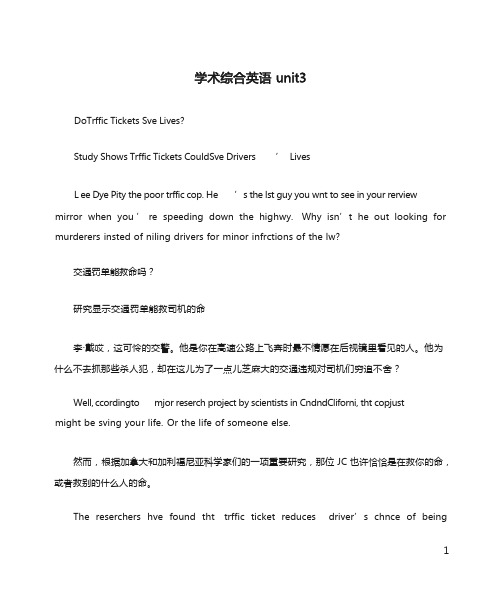
DoTrffic Tickets Sve Lives?Study Shows Trffic Tickets CouldSve Drivers ’ LivesL ee Dye Pity the poor trffic cop. He ’s the lst guy you wnt to see in your rerview mirror when you ’ re speeding down the highwy. Why isn’t he out looking for murderers insted of niling drivers for minor infrctions of the lw?交通罚单能救命吗?研究显示交通罚单能救司机的命李·戴哎,这可怜的交警。
他是你在高速公路上飞奔时最不情愿在后视镜里看见的人。
他为什么不去抓那些杀人犯,却在这儿为了一点儿芝麻大的交通违规对司机们穷追不舍?Well, ccordingto mjor reserch project by scientists in CndndCliforni, tht copjustmight be sving your life. Or the life of someone else.然而,根据加拿大和加利福尼亚科学家们的一项重要研究,那位 JC 也许恰恰是在救你的命,或者救别的什么人的命。
The reserchers hve found tht trffic ticket reduces driver’s chnce of beinginvolved in ftl ccident by whopping 35 percent, t lest for few weeks. The effect doesn’t lst long, however. Within three tofour months, the ledfoot is bck on the pedlnd the risk of killing yourself or someone else is bck up to where it ws before tht copstred you in the eye nd wrote out tht expensive cittion.研究者们发现一张交通罚单能让司机至少在几周内遭遇重大车祸的概率降低 35% 。
《综合英语》Unit3 Do Traffic Tickets Save Lives13-15
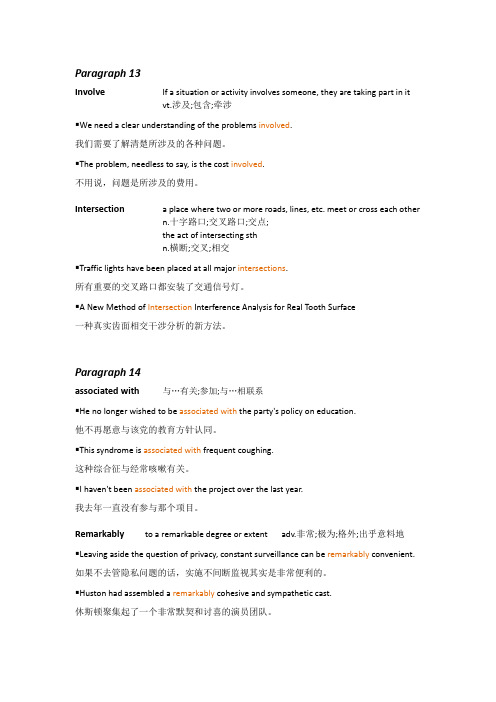
Paragraph 13Involve If a situation or activity involves someone, they are taking part in itvt.涉及;包含;牵涉■We need a clear understanding of the problems involved.我们需要了解清楚所涉及的各种问题。
■The problem, needless to say, is the cost involved.不用说,问题是所涉及的费用。
Intersection a place where two or more roads, lines, etc. meet or cross each othern.十字路口;交叉路口;交点;the act of intersecting sthn.横断;交叉;相交■Traffic lights have been placed at all major intersections.所有重要的交叉路口都安装了交通信号灯。
■A New Method of Intersection Interference Analysis for Real Tooth Surface一种真实齿面相交干涉分析的新方法。
Paragraph 14associated with与…有关;参加;与…相联系■He no longer wished to be associated with the party's policy on education.他不再愿意与该党的教育方针认同。
■This syndrome is associated with frequent coughing.这种综合征与经常咳嗽有关。
■I haven't been associated with the project over the last year.我去年一直没有参与那个项目。
新编研究生综合英语教程UNIT3汉译英讲解及答案
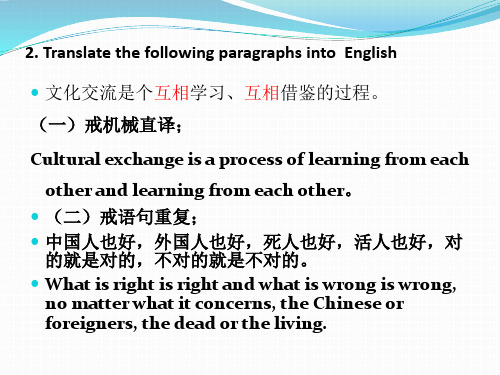
重复的名词写成被修饰的词,第二个句子出现这个名
词要写成定语。 例子:2001年,反倾销案件猛增到创纪录的348起,这 个统计数字(348)表明贸易保护主义正在迅速的蔓延, (贸易保护主义)并日益成为国际贸易中一个严重的 问题。 Anti-dumping cases suddenly rose to a record high of 348,indicating a rapid speed of trade protectionism , an increasingly serious problem in international trade.
(三)主语、宾语里有动宾关系可以写成名词+of+名词的形式,by引导动作执行者
文化交流是个互相学习、互相借鉴的过程。 The cultural exchange is a process of learning and drawing on experience from each other. 例句: 旅游基础设施大量侵占沿海土地,这严重地破坏了脆弱的 陆地生态系统和湿地。 The occupation of coastal areas by tourist infrastructure leads to destruction of vulnerable terrestrial ecosystems and wetlands. 西方社会一味地追求经济发展,总体看来,非但没有优化 人们的社会生活,相反有恶化趋势。 The continue pursuit of economic growth by Western Societies is to reduce rather than increase social welfare.
综合英语3 unit3课后练习答案
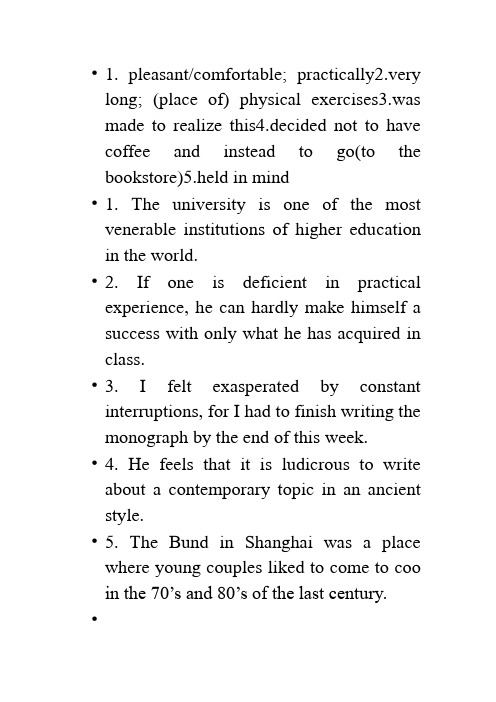
•4. He feels that it is ludicrous to write about a contemporary topic in an ancient style.
•5. The Bund inShanghaiwas a place where young couples likedto come to coo in the 70’s and 80’s of the last century.
•
•6. His daughter is very sedate for a girl of about ten, for she likes reading more than playing.
•7. The couple strolled hand-in-hand along the country road when the sun in its first splendor steeped the earth.
•8. The poet was commonly considered as an eccentric romantic genius when alive.
批注本地保存成功开通会员云端永久保去开通
•1. pleasant/comfortable; practically2.very long; (place of) physical exercises3.was made to realize this4.decided not to have coffee and instead to go(to the bookstore)5.held in mind
大学英语综合教程unit3参考答案
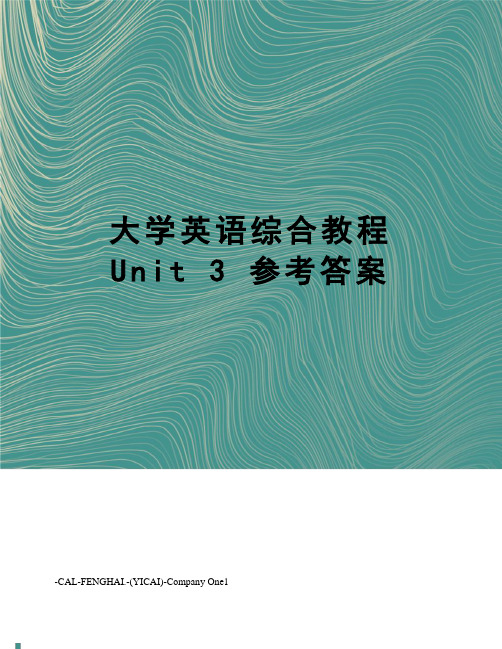
大学英语综合教程U n i t3参考答案-CAL-FENGHAI.-(YICAI)-Company One1Key to Unit 3Text A Public Attitudes Toward Science课前预习Directions: Read the text and find out the English versions for the following expressions.1.享有特权的少数人 a privileged minority (Para.1, L.6)2.大多数民众the vast minority of population (Para.1,L.8)3.将时钟拨回到从前put the clock back to an earlier age (Para.2, L.1)4.阻止未来的进一步发展 prevent further advances in the future (Para.2, L.3)5.带来技术的发展bring about advances in technology (Para.2, L.6)6.压制新生事物suppress anything new (Para.2, L.10)7.人的积极极性和创造力 human initiative and inventiveness (Para.2, L.10)8.延缓变化的速度slow down the rate of change (Para.2, L.12)9.确保方向正确的变化ensure the changes in the right direction (Para.3,L.2)10.在一个民主社会in a democratic society (Para.3, L.3)11.做出明智的决定make informed decisions (Para.3, L.5)12.对科学抱着矛盾的态度 be in two minds about science (Para.3, L.7)13.生活水平的稳步提高the steady increase in the standard of living (Para.3, L.8)14.科幻小说science fiction (Para.3, L.17)15.利用这种兴趣harness this interest (Para.4, L.1)16.以一种枯燥乏味的方式 in a dry and uninteresting manner (Para.4, L.6)17.认识其与世界的联系see its relevance to the world (Para.4, L.7)18.通俗读物popular books (Para.4, L.11)19.倾向于做某事tend to do sth. (Para.5, L.1)20.科学概念scientific concepts (Para.5, L.4)21.用文字和图表表述convey sth. by words and diagrams (Para.5, L.4)22.提供基本框架provide the basic framework (Para.6, L.1)23.阐明新的发展put across new developments (Para.6, L.8)24.小部分人 a small proportion of the population (Para.6, L.10)25.科学奇迹scientific wonders (Para.6, L.12)26.负有教育民众的重任have a responsibility to educate the public (Para.6, L.16)27.娱乐民众entertain the public (Para.6, L.16)28.危机四伏be filled with dangers (Para.7, L.1)29.接触外星文明contact an alien civilization (Para.7, L.2)30.充分相信have sufficient faith in sth. (Para.7, L.4)巩固应用I. Directions: Now you’ve learned Text A in detail. Let’s check how much you’ve learned from it! Please translate the Chinese expressions in the following sentences into English. Be sure you use expressions from the text.1.Whether you believe it or not (信不信由你),we were left waiting in the rainfor two hours.(Para.1, L.1)2.We saw /viewed this event as a turning point (把这件事看作是一个转折点).(Para.1, L.4)3.I can’t afford a car, so I guess I will have to do without (就只好不用了) . (Para.1,L.7)4.Forget all about it and look to the future; you can’t put the clock back (让时光倒流). (Para.2, L.1)5.He can’t see, nor could he hear (他还听不见) until a month ago. (Para.2, L.3)6.I have come to realize (逐渐意识到) that what I have done is misguided.(Para.3,L.7)7.As was mentioned in my last letter (正如上封信中所提到的),I’ll be back inOhio in June. (Para.3, L.15)8.I am wearing twice as much as I usually do (是平时穿的两倍) because of thecold weather. (Para.4, L.14)ter, I’ll prove what you say wrong (证明你所说的是错的). (Para.7, L.5)II. Language FocusEx. I. Translate the following English expressions into Chinese and Chinese into English.1.The line of products will be highly profitable.这个行业的产品将十分有利可图(P.67-I-3-3)2.regain health 恢复健康 (P.68-II-1)3.the right attitude towards science 对科学的正确态度 (P69-Cloze 1- L.1)4.the proportion of the population that………人口的比例 (P.69-Cloze 1-L.9)5.make discoveries that have practical value 做出具有实际应用价值的发现(P.69-Cloze 2- L.5)6. a glass wire 光纤 (P.70-Cloze2-L.7)7.endless number of new discoveries 无穷无尽的新发现(P.70-Cloze 2- L.10)8.in a space station in orbit around the earth 在一个围绕地球轨道运行的空间站(P.70-Cloze 2- L.17)9.扔掉这些旧椅子get rid of these old chairs(P.66-I-1-5)10.及时的帮助timely help (P.66-I-1-9)11.做出精确的预言make accuratepredictions (P.67- I-3-3)12.对……迟疑不决be undecided about(P.68- II-2)13.山区the mountainousregion (P.68-II-3)14.缺少,不足be undersuppliedwith (P.68- II-3)15.提出……的要求作为demand... as… (P.68-II-5)16.在做某事上有困难have difficulty (in) doingsth. (P.68-II-7)17.总的来说on balance (P.69-III-2-4)18.优点多于缺点Strengths outweighweaknesses. (P.69-III-2-4)19.对……怀疑be distrustful ofsth. (P.69-Cloze 1-L.2)Ex. II. Please translate the Chinese expressions in the following sentences into English. Be sure to use expressions from the exercises.1.As pace of life quickens (随着生活的节奏加快), things tend to change fast in thecity. (P.66-I-1-4)2.The decision on the new project is made on the basis of scientific study (在科学研究的基础之上). (P.67-I-3-2)3.We have succeeded because we had the foresight to invest in new technology(投资于新技术的先见之明). (P.68-II-6)4.Only a minority of people support military action. The majority are for a peacefulsolution (赞成和平解决). (P.69-III-2-1)5.Applicants who meet our job requirements (符合我们的工作要求) are accepted,those who fall short (不符合条件的) are rejected. (P.69-III-2-2)6.As is shown by history (正如历史所表明的), local clashes may lead to a globalwar. (P.69-III-2-5)III. Language EnhancementEx. I. Translate the following Chinese sentences into English.1. 无论你是否相信,我们的家乡在过去的十年间发生了许多变化,而且在未来的十年里变化会更多。
- 1、下载文档前请自行甄别文档内容的完整性,平台不提供额外的编辑、内容补充、找答案等附加服务。
- 2、"仅部分预览"的文档,不可在线预览部分如存在完整性等问题,可反馈申请退款(可完整预览的文档不适用该条件!)。
- 3、如文档侵犯您的权益,请联系客服反馈,我们会尽快为您处理(人工客服工作时间:9:00-18:30)。
What do you choose, to be a completely civil person or just be polite when it is needed? When someone treats you rudely, what is your response? What kind of behavior is considered as uncivil? Can you list some examples?
Expressing disagreement
B. Asking for and giving information
LSP IV Reporting & Checking up
2015/7/27
Giving specific information & Expressing pleasure
8
LSP I
14
LSP IV
2015/7/27
15
Dialogue 1
Warming-up
questions Teacher’s questions Language points Retelling outline Discussion
2015/7/27
16
Warming-up questions
According to A and B, what usually happens when the bus is late? Is it very crowded?
Does what A and B describe in the dialogue often happen in the city where you are? How should young people behave? What’s your opinion?
19
2015/7/27
Teacher’s questions
What: a bus ride At the terminal: the big crowd---turned into a charging / attacking mob---rushing the door--pushed hard and elbowed their way to the front---pushed and pressed their way onto the bus On the bus: fight one’s way out---with no order---robust young men seldom offer their seat to the weak
draw sth. on the desk
cut / carve in the wall
do not respect elders or love children
18
2015/7/27
Teacher’s questions
Listen to the recording and answer some questions:
2015/7/27 4
Language Structure Practice
The passive voice (1) involving the modal auxiliary have to The pupils should be told that their homework has to be checked before they hand it in. (2) converted from the active sentence with a direct and an indirect object She isn’t paid anything for overtime. (3) involving the verb phrase/phrasal verbs I don’t think anybody should be made fun of because of his physical handicap. (4) formed by the They say/It is said… patterns 2015/7/27 5 They say / It is said that three parks will be expanded.
Language Structure Practice
Practice: Change the sentences into the passive voice where possible. Someone says Professor Bao will come to see Liu and Zhen in their dorm this afternoon. Their room looks a bit dirty and untidy. They will give the room a good clean in the morning. They have to throw away the old newspapers and put everything in order. Besides, they have to take down the old posters from the wall and put up some new ones. They will make their room neat and tidy and leave a good 2015/7/27 6 impression on the professor.
2015/7/27 7
Language Structure Practice
LSP I Expressing slight anger & Making a suggestion
LSP II
Asking for and giving information LSP III
A. Expressing sympathy & Making clarification &
Language Structure Practice
It is said that Professor Bao will come to see Liu and Zhen in their dorm this afternoon. Their room looks a bit dirty and untidy. It will be given a good clean in the morning. The old newspapers have to be thrown away and everything has to be put in order. Besides, the old posters have to be taken down from the wall and some new ones have to be put up. Their room will be made neat and tidy and a good impression will be left on the professor.
Unit 3
Language Structures Dialogues I Farewell to rude Manners Readings I A Shopper’s Nightmare Reading II A Letter of Complaint Exercises
2015/7/27
B: NoIII-A
A. Expressing sympathy & Making clarification & Expressing disagreement A: Poor Tom! Lots of people make fun of him. B: Why do they do that? A: Because he walks with a limp. B: Well, I don’t think anybody should be made
Expressing slight anger & Making a suggestion Oh dear! My pupils’ homework is full of A: careless mistakes. B: Did you tell them to check their homework before they hand it in? A: No, I didn’t. B: I think they should be told their homework has to be checked before they hand it in.
fun of because of his physical handicap.
2015/7/27 11
LSP III-A
身体缺陷
2015/7/27
12
LSP III-B
B. Asking for and giving information
A: How was the exhibition? B: Very good. A: Were brochures handed out to visitors? B: Oh, yes, they were.
Structure: be + v-ed (pp)
2015/7/27 2
Language Structure Practice
2 be + v-ed (pp) V.
2015/7/27
16
3
Language Structure Practice 1. 一般现在时 is\am\are + P.P 2. 一般过去时 was\were + P.P 3. 一般将来时 will be + P.P 4. 现在进行时 is\am\are + being + P.P 5. 过去进行时 was\were + being + P.P 6. 现在完成时 have\has been + P.P 7. 过去完成时 had been + P.P
